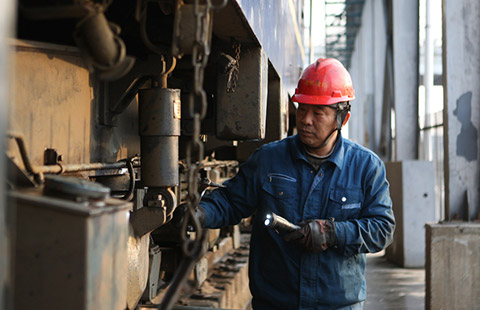FTA a win-win for China and Switzerland
 |
|
Pauline Houl says Sino-Swiss relations are dynamic.[Photo provided to chinadaily.com.cn] |
Editor's note: China and Switzerland have agreed to upgrade their free trade agreement during President Xi Jinping's state visit this week.
Witnessed by Xi and his Swiss counterpart Doris Leuthard, the two sides signed 10 documents to boost cooperation in areas including free trade, clean energy, sports, customs and intellectual property.
The four-day trip marks not only Xi's first state visit to Switzerland, but also the first time that a top Chinese leader has attended the Davos World Economic Forum, an annual gathering of global political and corporate leaders.
Here we present excerpts of a Q&A with Pauline Houl, Secretary General of Swiss Chamber of Commerce in Beijing, on her insights into the future prospect between the two countries.
Q1: It was President Xi Jinping's first state visit to Switzerland. What impact this will have on Sino-Swiss relations?
This visit shows clearly that relations between Switzerland and China are not only close but also very dynamic, especially in these last few years.
This is excellent news to Swiss companies in China, as the state visit might play an accelerating role in the implementation of certain measures related to Free Trade Agreement (FTA).
The visit is also an opportunity for Switzerland to reinforce its position as a country located at the heart of Europe with business-friendly environment for Chinese investors and companies.
There are currently around 100 Chinese companies in Switzerland. There's also a growing interest from Chinese investor for Swiss brands in terms of M&A, targeting commodities but also sports, media and technologies, such as the deals between ChemChina and Syngenta, between Dalian Wanda and Infront Sports & Media.
Following the state visit of Swiss president last April, the signature "Innovative Strategic Partnership" and of course the FTA, we expect there will be more synergy and business opportunities for Swiss and Chinese companies in the two countries.
Q2: Over the past few years, Chinese leaders have been actively participating in the annual meeting of the World Economic Forum in Davos. In your opinion, what is the significance of Chinese leaders attending the Davos forum especially given the world economy is stagnant and the anti-globalization sentiment is spreading?
The World Economic Forum is a place where leaders talk to leaders. In the past, the Chinese leaders didn't participate very actively in the World Economic Forum because of language barriers. They could not bring an assistant with them. Things have changed since then and Chinese leaders are now aware of the importance of the opportunities to meet leaders of other countries to learn from each other. Every leader all over the world face the same issues.
China is in a transition period which is very crucial not only for its future development but also for the future of the world economy. The Chinese economy is integrated to the world economy and it is important that there is a dialogue between Chinese leaders and foreign leaders. The Chinese culture promotes more soft power than direct confrontation. The way Chinese leaders communicate is also different from foreign leaders. But their active participation shows that China is more open to the world than ever before. China is facing challenges that western economies has faced in the past. It's important for the Chinese leaders to learn also from the financial crisis, which has shaken the world.
Fang Xinghai, vice-chairman of the China Securities Regulatory Commission, told a packed room, "We are learning. We are doing it". Fang, whose regulatory commission was responsible for much of the stock market intervention last year, added: "We should do a better job". The World Economic Forum focuses on the long-term vision of the global economy and China is a country which learns fast. China's economy is slowing down, but it's not collapsing.
Q3: How do you evaluate the role played by the Sino-Swiss FTA in the two countries' economic cooperation? What are the benefits of the FTA in Switzerland?
First, it is worth mentioning that Switzerland is the first and so far only European country that has concluded an FTA with China, which is already a remarkable achievement.
The FTA is quite comprehensive as it not only aims to improve mutual market access but also enhance the legal security for the protection of IP and bilateral economic exchange in general.
The FTA represents thus a true win-win agreement as both economies are complementary.
It is also important to keep in mind the agreement went into effect only in July 2014, and some measures need to take time to be implemented. Generally the expectations are met. These positive effects will be strengthened in the future.
For the future, we expect a better access to Chinese market for innovative goods and services and progress in the field of industry certification.
Since the FTA was signed, China's interest in Switzerland has not stopped growing. Various factors help Switzerland attract Chinese investors. First, they appreciate the flexibility of the Swiss authorities when it comes to settlement procedures. The agreement will not only boost trade and investment between our two countries, it will actually create a whole new framework for bilateral cooperation in many fields. It is in our mutual interest to keep an open and ongoing dialogue on topics such as sustainable development or in the area of services for example. In this agreement, both countries have expressed their willingness to do so.
For an open country like Switzerland, it is always important to develop trade exchanges, all the more so with one of the most thriving nations in the world, it is also necessary to nurture close contacts and enhance mutual understanding. In collaboration with private sectors, it is therefore now our task to identify needs and opportunities in order to maintain an active, effective and useful dialogue, building on the strong foundations which have been laid.
Q4: Official data showed that in 2015, Sino-Swiss bilateral trade reached $44.27 billion, of which China's imports from Switzerland amounted to $41.1 billion. What measures do you think will be taken to promote trade between the two countries?
With the FTA in effect over two years, we already saw positive impacts. Yet there is still a whole series of problems to be solved. The scope of the agreement is much larger than the other free trade agreements signed by Switzerland previously.
China is one of Switzerland's most important foreign trade partners, the largest market for Swiss exports in Asia and the third-largest worldwide after the EU and the US.
The agreement in tariff reduction is a relief for the Swiss economy, especially given the current strength of the Swiss franc. It gives solid competitive advantages to Swiss companies exporting goods and services to China while generally improving the business environment for Swiss companies, of which there are now over 800 operating in the country. As a matter of fact, the general predictability and legal certainty of economic activities between the two countries are enhanced and the protection of intellectual property is reinforced. The FTA provides countless opportunities for investors from both sides.
The FTA will demonstrate its full potential in the longer term. After two years and half of implementation, there are still several open questions and uncertainties in its application. The signing of the FTA was not the final act of this agreement. Given the high complexity of international trade and its wide scope, the FTA should rather be seen in progress. In this sense, implementation and experiences gathered by companies are essential for its long-term success.
With experiences gathered from companies, the Swiss government will bring substantial contribution to the institutionalized FTA Joint Committees which aimed to supervise and monitor the implementation of the agreement.
Q5: What will be its impact on companies and consumers of both countries? What are the benefits as the two countries deepen economic and trade cooperation?
Innovation is an area of excellence of Switzerland. It is considered as the most innovative country in the world. Innovation is the top priority for China now and so it is very interesting for both parties to cooperate together.
China is now looking for quality production and high technology so they need advanced machinery where Switzerland is very strong.
The improvement of infrastructure is also a key priority, as the Belt and Road Initiative launched by China aims to strengthen trade ties with countries along the routes.
Switzerland is well-placed to play a role in the development of these new trade routes. Not only is Switzerland the first continental European country to have signed an FTA with China, it is also one of the first Western European states to have applied for membership in the AIIB. Moreover, Switzerland is currently positioning itself as one of the leading centers for the internationalization of the RMB in Europe.
With their strong track record of establishing clean energy and transport infrastructure, Swiss companies could play an important role in the development of the entire region under one belt, one road coverage. Swiss companies operating in areas such as agriculture, nutrition, financial services, transport as well as health and life sciences could also benefit from increased demand that comes with economic development.























